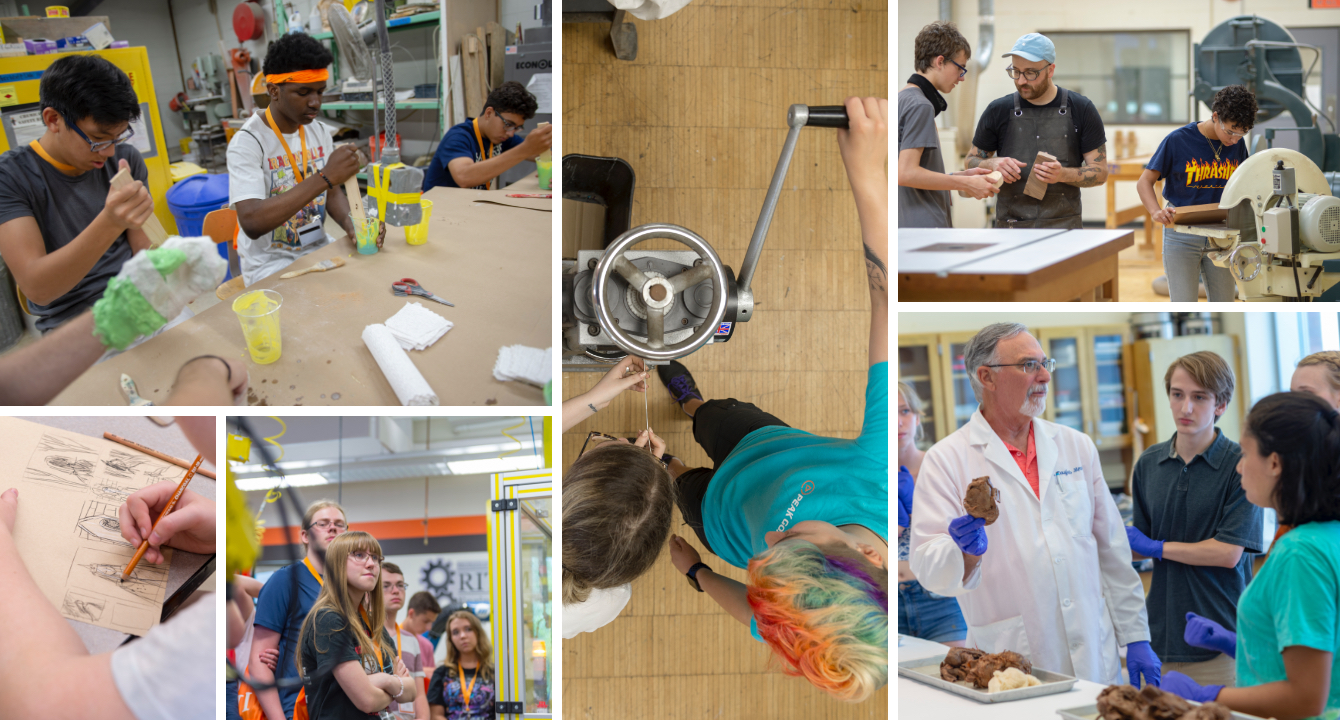Not everyone knows what they want to major in when they go to college. That’s perfectly normal. With hundreds of academic programs to consider, it’s no wonder that choosing a college major can feel overwhelming.
Fear not. We’ve outlined some guidance to get you started on understanding college majors, how career exploration can help you identify your interests, and how both of these can work together to help you in choosing a college major.
What is a College Major?
A college major is an area of study you will specialize in while attending college. This course of study is outlined by the school and includes curriculum (a fancy word for the courses you’ll take) and other requirements you’ll need to complete in order to earn a bachelor’s degree.
Many college majors may also have an accelerated dual-degree option. These combined accelerated pathways enable you to earn both a bachelor’s and a master’s degree in as little as five years of study.
How Important is Your College Major?
A college major will help provide a broad base of knowledge in a certain field of study. For certain career paths, your college major is crucial to establishing a foundation of skills you will need in order to succeed in a multitude of professions. This is true for careers in medicine and health care, education, engineering, computing, and technology. These fields are nearly impossible to break into without pursuing a major in these fields or in a closely related discipline.
Many college graduates find employment in careers that have nothing to do with their college major. That’s why, no matter what you choose to major in, it’s important to attend a college that has a wide range of experiential learning opportunities. These experience-based opportunities–which can include internships and cooperative education, study abroad, volunteering and community engagement, undergraduate research, entrepreneurship, and more–provide you with valuable career experience, expose you to companies and organizations, expand your network of professionals, and broaden your overall knowledge. These experiences also help prepare you for a range of careers regardless of your major.
College Minors
Created as a set of up to five courses in a specific area of study, college minors can develop a secondary area of interest beyond your major, add versatility to your course work, diversify your knowledge, and broaden your skills. For example, many art and design majors choose to minor in business to gain the knowledge needed to own and manage their own studios, or to help operate museums and art organizations. Students who have an eye toward medical school or a graduate program in the health sciences may add a minor in nutritional sciences or exercise science to expand their knowledge in health, nutrition, and physiology. A college minor makes you more competitive as a job candidate and can strengthen your application to graduate schools.
College minors also enable you to pursue personal interests as well. Many game design students choose a minor in Japanese language or culture to gain an appreciation for the country’s dominance in gaming. Minors in theater arts and music performance can keep you involved in activities you enjoyed in high school that you would like to continue to pursue for fun in college.
Career Exploration: The Key to Defining Your Career Goals
Choosing a college major is about focusing in on what you like to do, understanding where your talents lie, and learning how to translate your interests into a career.
Career exploration improves your knowledge of career paths and options, and can help you connect which college major pairs best with your professional aspirations. Career exploration matters because it can help you understand your skills and interests, what you like to do (and what you don’t), and how college majors can lead you to where you want to go professionally.

3 Tips for Choosing a College Major
Searching for a college can be a challenging and time-consuming task. There are a lot of things to consider and you want to get it right. Here’s how you should begin:
- Tip 1: Identify Your Interests
Let’s explore what you like to do. Are you creative and artistic? Do you like to tinker and test? Do you like to help people? Are you a problem solver? Understanding your interests can help point you in the direction of certain career fields.
It’s also equally helpful you to know what you don’t like to do. If you dislike math, engineering and technology majors may not be the best fit for you. If you’re not comfortable working with children you might want to skip majors in education. - Tip 2: Acknowledge Your Skills
Think about what high school classes you have enjoyed and which you have excelled at. If writing and storytelling feels natural to you then you should explore majors in English, communication, film, or journalism. If you get excited about the sciences and the idea of discovery then majors that focus on research, like biology, biomedical sciences, chemistry, or biochemistry, can feed this curiosity. If you’re most comfortable in a studio space being creative, majors in art, design, or photography can help you develop your skills and expand your creative aspirations.
There are also college majors designed for you to combine diverging interests in dynamic and exciting ways. Do you have a range of interests that don’t fall into one convenient major? Individualized study combines courses from a range of majors to create a customized plan of study tailored around your personal ambitions. New Economy Majors are majors that pair courses in technology, the arts, and design to prepare you for careers that have not been created yet. These majors address the needs of emerging career fields, where forward-thinking employers are looking for students with analytical thinking, complex problem solving, creativity, resiliency, and flexibility. - Step 3: Explore Career Fields, Not Majors
By exploring careers fields, and then pairing the right major to that field, you can avoid choosing a college major that’s too rigid or too exclusive. As your knowledge and experience grows throughout your time in college, you’ll want a major that offers expansive career options as well as career flexibility.
In exploring career fields, you’ll learn that some majors have many more career paths than you originally imagined. You’ll also discover careers you never knew existed. Career exploration can also help you avoid the close associations some majors have with specific careers. For example, a degree in photography doesn’t mean you’ll end up working as only a photographer. It can lead to careers as a multimedia journalist, a visual archivist, a museum curator, or an artist’s agent. Researching a career field versus a college major can help you avoid associations that can influence, and limit, your understanding of career options while enhancing your understanding of the full range of career paths in a particular field of study.
How Do College Majors Lead to a Career?
Your college major is more than just a collection of courses and experiences. It’s a pathway to launching your career. Once you decide on a career field, now’s the time to start exploring college majors to determine which major will provide you with the knowledge and skills you need to reach your career goals.
Understand the Requirements of Certain Career Paths
As you explore career fields, you’ll also learn which pathways require more than just a bachelor’s degree. Some require graduate degrees in order to enter the field or continue to advance in the field professionally. You should know the full extent of the educational requirements of a career field before you decide a career path is the right one for you. For example:
- Many careers in the health professions and medical sciences require advanced education. Medical doctors need to complete medical school, followed by a medical residency. Physical therapists need to have a doctorate degree.
- To become a lawyer, you need to attend law school to earn your juris doctor (JD) degree and pass the bar exam before you can practice law.
- Most states require teachers to have a master’s degree and teaching certifications.
Exploring career paths will help you understand the full educational requirements needed for a particular field, plus any additional credentials (licensure, certifications, etc.) you’ll need to earn beyond your bachelor’s degree.

You’re on Your Way
Deciding on a college major is an exciting experiment in understanding more about yourself and what you like to do. It’s as much an exercise in self-reflection and discovery as it is in research and learning. Hopefully you’ll be happily surprised by what you learn about yourself, and excited about the career paths you discover. It’s the beginning of what shape your future will take. Jump in and start exploring.










